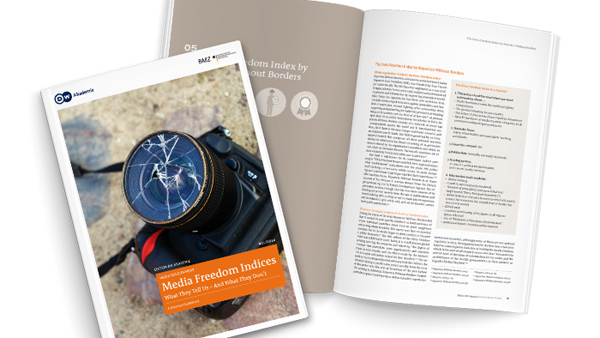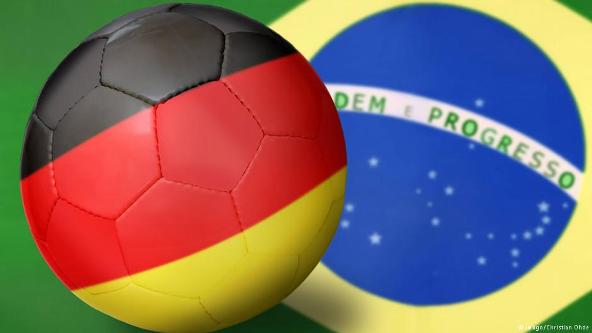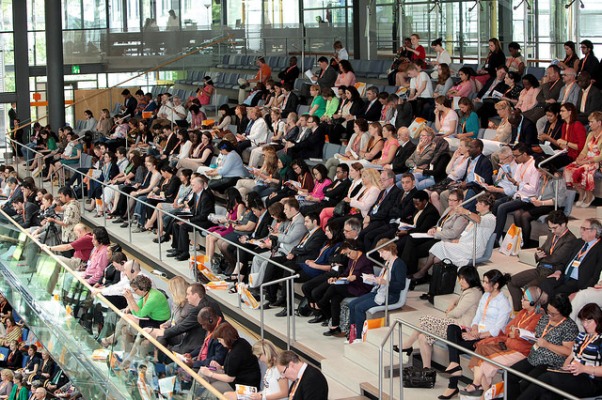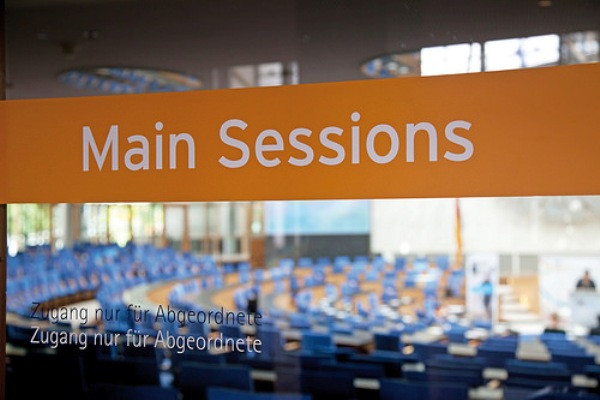A real life game of thrones
DW has been online for 20 years and was the first German public broadcaster to venture into the unknown world of the Internet in 1994. The world has indeed changed a lot since then – not necessarily with the level of conflict or the importance of accurate news reporting, but definitely with how people communicate and consume information.
We wanted to commemorate this anniversary by showing how DW has evolved into a leading global online information provider, covering the complexity and diversity of global issues. For the tenth anniversary, DW created a website in the Klingon language from Star Trek. For the twentieth anniversary we once again looked to the world of popular fantasy and we didn’t need to look much farther than the Game of Thrones – the hugely-popular TV series that has captured the imagination of millions with intriguing stories that create an intricately detailed history.
Just like the stories that fill DW’s 30 homepages everyday, the world of Game of Thrones is full of complexity, conflict and intrigue. We applied our high standard of journalism to explaining and clarifying these issues and created a news website that covers the all the important events and personalities of Westeros.
The world of Westeros can be hard to understand all at once– weather it is turbulent financial markets, continual threats of invasion or mysterious celebrities. Using a clever and somewhat satirical approach, DW covers the news of this fantastical world, just like we do with the issues and struggles in the real world.
DW will continue to report the news from extraordinary places and make a complex world easier to understand. There is no limit to where the next ten years could take us.
The fight for freedom of opinion
DW makes education a priority – in all respects. Our DW Akademie has been trusted with the task of providing training to media professionals worldwide – especially in countries or areas where this proves to be difficult. DW Akademie is publishing as well – with research and reports dealing with the most pressing media issues. The first of a new series is online now: Media Freedom Indices. What They Tell Us – And What They Don’t.
Every year organizations such as Reporters Without Borders and Freedom House publish their respective press freedom rankings. They usually cause an outcry, especially from countries low on the list. While politicians hotly defend their media policies, opposition parties and NGOs seize the opportunity to criticize the government’s approach.
Media researcher Laura Schneider uses data as well as interviews with experts to examine the methodology used in each of the five best known press freedom indices. She takes a closer look at the organizations doing the ranking as well as how they conduct their respective ratings. Schneider also investigates the advantages and disadvantages of each index and points to aspects which could be improved.While press freedom rankings determine national and international media policies, it is not always clear as to how objective these rankings really are.
Schneider’s biggest criticism is that the ratings aren’t objective, often being carried out by a handful of academics or media experts who are mostly from western countries. This inevitably results in a bias, especially as the majority of the ranking organizations fail to state their exact definition of media freedom.
Download the report here.
Market roundup: July 2014
South America
News and information from DW Portuguese for Brazil is now being featured on UOL (Universo Online SA), Brazil’s largest online portal and the world’s largest Portuguese-language news and information platform. After a recent cooperation agreement, UOL will now include a full-text DW feed on the website. The cooperation has the potential to greatly increase DW’s online audience – UOL boasts 29,8 million unique visitors and 4,2 billion page views every month along with 4.1 million Facebook fans.
Africa
DW news content in six languages for Africa will soon be able to reach a potential 900,000 users via BiNu– an application that allows low-tech or “feature phones” to have quick and easy access to the Internet. Target regions include Nigeria, Kenya, South Africa, Ghana, and especially, Ethiopia and Zimbabwe.
Asia
CTH, the Thai television provider and DW broadcasting partner, has increased its range of service and is now broadcasting via the Vinasat 2 satellite. The expansion will deliver CTH’s international programming package, which includes the English-language channel, DW, to 10,000 additional subscribers along with the millions of current cable subscribers. CTH is also planning to start a DVB-T service later this year which could reach a potential of one million new customers. DW has been carried on CTH’s digital cable network since July 2013.
The Vietnamese cable provider, HCA TV, is once again broadcasting DW after an extended interruption in service. DW programming will be rebroadcast on the provider with Vietnamese subtitles.
The Taiwanese online news and information portal, Commonwealth, will now be including full-text DW content in Chinese. It is the first such cooperation outside of mainland China and will include reports from business, the environment, sports and education.
Europe
T24, the Turkish online news portal, is a new DW partner and will now be prominently placing full-text Turkish language articles from DW on the website. T24 is renowned for independent and quality journalism in an increasingly draconian Turkish media landscape, having won an award from the Turkish Journalists Society in 2010. It is one of the most-quoted online sources in Turkish media and features content from more than 30 prominent authors and journalists.
Online
DW is now on Instagram with Inside DW, a new part of DW’s customer service website, MyDW, which features a look behind the scenes at the work of DW’s journalists, producers and correspondents.
Journalisitc expertise has helped define the Global Media Forum
An important part of DW’s mission is sharing its 60 years of journalistic and media experience with the world. DW has organized a number of events at the 2014 Global Media Forum in cooperation with organizations and partners which represent the high level of expertise at Germany’s international broadcaster.
Complementing the focus of this year’s conference is a panel organized by the DW Akademie that explores the state of participatory and community-based media in developing countries. The session titled, The power of the neighborhood: How local media organize participation and how DW Akademie supports this, showcases three projects that foster grassroots journalism from partner organizations that span the globe – Welad Elbalad Media Services from Egypt, Open Development Cambodia and Plataforma de Periodismo from Colombia.
With a focus on the watchdog role of journalism is a session titled Whistleblowers, activists, journalists: Is advocacy journalism the journalism of the digital age? The panel includes an editor from Zeit Online and a professor of entrepreneurship and media literacy from the Walter Cronkite School of Journalism and Mass Communication at Arizona State University. The emphasis is on how digital media allows journalists to shed their neutrality and take an active stance on social issues.
Those interested in the EU and public participation should look at a session titled, Turning disinterest into engagement through innovative media formats. Hosted by DW in cooperation with the Institute for Foreign Cultural Relations (ifa), the discussion explores innovations in social media and journalism that are combining to increase citizen engagement in social issues, particularly with the context of EU policy and elections.
At the intersection of social media and human rights is a talk hosted by DW titled, Revolution postponed. The Arab Spring and Africa The discussion brings together African social media experts and journalists to analyze the state of social movements all over Africa, whether it is the Arab Spring in the north to political protests everywhere from Angola to Zimbabwe. The panel will explore if the movements have lost momentum and what the future may look like.
How to create democracy and promote development with digital media
Digital media is changing the world and giving more people everywhere the chance to have their voices heard and participate in social processes. This year’s Global Media Forum will explore the complex diversity of these issues along with experts, policy makers and interested guests from all over the world. With so much to choose from, we wanted to highlight some events and partners that you should look for at this year’s conference.
A session hosted by the German Development Institute titled, Transcultural understandings of legitimacy: A pre-condition for global governance?, will explore the effectiveness of international institutions in achieving legitimacy on the ground in the different countries and cultures where they operate. The focus will be on increasing trans-cultural dialogue in order to create common values and common solutions.
The Friedrich Naumann Foundation for Freedom is hosting a panel discussion that will explore how social media is helping foster democracy around the world. The session titled, The role of (social) media in promoting and sustaining democratic governance, features guest experts from Lebanon, Egypt, India and Myanmar who will discuss how social media initiates and even stabilizes processes of social change.
A plenary discussion hosted by ASHOKA titled, Room for all? How social entrepreneurs in media are forging a new infrastructure for participation, explores the changing structure of global media. The discussion focuses on the role of the media and audience in light of digital media and where the traditional information power structure is changing to allow for the creation of a new public sphere. Challenges will be introduced like finding new audiences and financing, how to bring in new participants and ways to create new “information communities.”
A talk hosted by Voices of Africa Media Foundation will feature a case study from Nairobi, Kenya that provided young people living in the cities slums the chance to become reporters. The talk titled, A case study in enabling residents from informal settlements to participate in decision-making, will showcase some results from the project which provides an example from Africa for how disadvantaged people can make their voices heard.
A workshop hosted by Wartburg College titled, A blueprint for building communities: Applying community-building practices to a news media company,” will explore how the traditional business a model has changed for big news organizations and how they can adopt practices from social media to increase their relevance and attract new audiences.
And that is not all! There is much more to see and learn at the 2014 Global Media Forum. The conference starts Monday June 30 and you can follow the events with live updates on Twitter and Facebook or on the press website.













Feedback